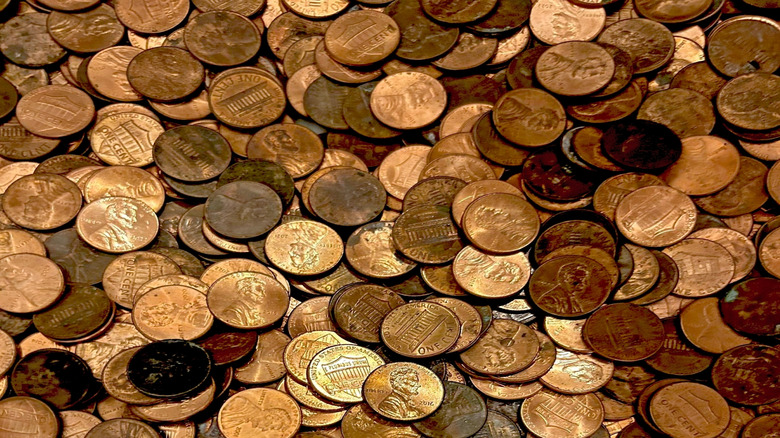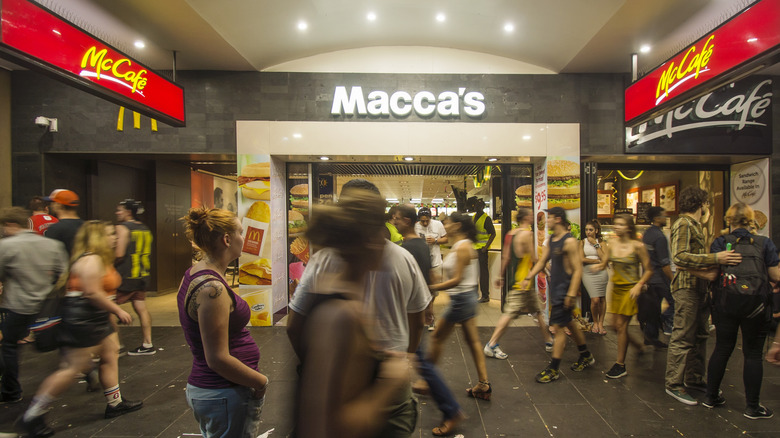America's Penny Shortage Is Having An Unexpected Effect On McDonald's Prices
Due to the scarcity of pennies in certain parts of the U.S., McDonald's has implemented a new policy where purchases will be rounded to the nearest nickel for customers who don't have exact change. The new policy won't affect customers who pay with credit cards, debit cards, or an app.
McDonald's USA told ABC News that this new cash policy was in response to the U.S. Treasury Department halting the production of pennies, a coin Donald Trump wants to get rid of because each 1-cent piece costs more than 2 cents to make. At least, that's what Trump declared in a Truth Social post, though the United States Mint 2024 Annual Report states it actually costs 3.69 cents to mint each penny. "Following the discontinuation of pennies nationwide, some McDonald's locations may not be able to provide exact change," a McDonald's representative told ABC News via a written statement. "We have a team actively working on long-term solutions to keep things simple and fair for customers."
The U.S. Treasury expects Trump's penny production freeze will save the nation $56 million a year, per the Associated Press. Even so, it's already causing issues for certain businesses.
How the penny shortage impacts prices at McDonald's
Rounding to the nearest nickel means that purchases at McDonald's that end in 1, 2, 6 or 7 cents would be rounded down, while transactions that end in 3, 4, 8, or 9 cents would be rounded up. At least, that is how franchisee Bear Family Restaurants illustrated it on a sign posted at a McDonald's restaurant, per a Reddit post. While McDonald's franchisees decide on the pricing and deals in their restaurants, per the McDonald's website, it remains to be seen how the demise of the penny will impact McDonald's aims to put more savings on your plate.
But pennies won't disappear right away. There are about 250 billion U.S. pennies in circulation, according to the American Bankers Association. This means you shouldn't expect all pennies to become junk coins that are worth a ton of money — though there are at least 10 valuable pennies out there. At the same time, you don't want to just throw your average pennies away — they're still perfectly fine to use, and paying with them at registers could help get more circulating in your community. Plus, having pennies in your purse or pocket will help prevent any up-rounding incidents at your local McDonald's or any other future cash transactions should other businesses implement a rounding model.
McDonald's faced similar shortages internationally
This would not be the first time McDonald's dealt with a sudden coin shortage. As of 2024, there were 43,477 McDonald's restaurants across the globe, of which just 13,557 are in the United States, according to Merca2.0, an online newsletter for the international marketing industry.
The other 30,000 or so operate outside the U.S., including three countries where McDonald's has operated for decades where 1-cent pieces and other low-denomination coins are no longer in use: New Zealand, Australia and Canada. New Zealand removed its 1-cent and 2-cent coins from circulation in 1990, and stopped issuing 5-cent coins in 2006. Meanwhile, Australia removed its 1-cent and 2-cent coins in 1992, and Canada stopped minting pennies in 2012. In those three countries, merchants and businesses were encouraged to round off to the nearest 5- or 10-cent denomination.
While researchers found that prices headed downward when New Zealand got rid of its lower valued coins, according to Money.com, there is no official way to round off prices in the U.S. as of November 2025. That means there's no guarantee other businesses will adopt McDonald's rounding policy. So, hold off on tossing your pennies for now — especially if you pop into McDonald's on a regular basis.


